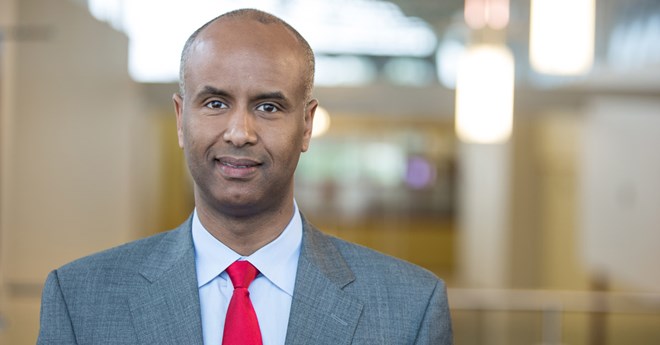
Saturday February 18, 2017
By Tom Blackwell

In 1993, a 16-year-old boy raised in the bloody cauldron of Somalia’s civil war left Africa for good and arrived alone in Canada.
If the young refugee experienced much culture shock, Ahmed Hussen hid it well.
Even as his asylum claim was being processed, the tall, lanky youth finished high school, then worked his way through a history degree at Toronto’s York University.
Barely 10 years after arriving here, the “dignified” African with a “polished accent” landed a job in the office of Dalton McGuinty, Ontario’s opposition leader, and moved with him soon after to the premier’s office. A law degree followed, and later a successful leap into elected politics as a member of the new Trudeau government.
Last month, at age 39, the fledgling MP was named Canada’s immigration minister.
Hussen’s dazzling climb to the political heights represented a remarkable counterpoint to what was happening south of the border, as a few weeks later President Donald Trump banned anyone from Somalia – and six other Muslim countries – from entering the United States.
“He’s just a great Canadian story,” raved McGuinty by email. “Canada welcomed him and now he will help us welcome others.”
But there’s more to Hussen’s story than just feel-good immigration success and repudiation of Trump-style nativism. He’s also confronted multiculturalism’s murkier side, and made surprising allies along the way.
As he rose within his adopted home, Hussen took a tough stand on the problems that roiled the young Somali community, fighting radicalization and extremism as some of the community’s young men turned to terrorism, and advocating for Somali-Canadian youth amid a spike in gang-related violence.
He even accepted a speaking invitation from a Republican congressman sometimes accused of Islamaphobia — who now backs Trump — and joined forces with a Jewish group to help steer Somali youth away from trouble.
His fans include former Conservative immigration minister Jason Kenney – who tweeted congratulations to his “friend” after the cabinet nod – and Tarek Fatah, the controversial journalist known for his provocative attacks on fundamentalist Muslims.
“Ahmed Hussen was sort of like a comrade … always speaking out, very articulate,” said Salma Siddiqui, a Fatah ally and president of the Coalition of Progressive Canadian Muslim Organizations.
Yet the man seems to have kept more-conservative elements of the Muslim community onside, too. The spiritual head of Toronto’s Sakinah Community Centre is Said Rageah, a Somali-Canadian imam who has said women “should stay at home and not come out of the house unless it’s a necessity.”
But the centre’s general manager, Rashid Mohamed, also from Somalia, said the community is thrilled by Hussen’s rise.
“He is really a role model to all our kids who are born here and grew up here,” said Mohamed.
Hussen himself has taken pains to shed the refugee-made-good mantle, saying repeatedly that he intends to serve the country as a whole, refusing even to criticize Trump. He holds only one citizenship — from his new home.
“I am a Canadian,” he stressed in his first news conference as minister.
His family left Somalia in 1992 and moved to neighbouring Kenya, and in February 1993, Hussen made it to Canada.
He settled first in Hamilton, then moved in with one of two older brothers who had immigrated earlier, living in Toronto’s hard-scrabble Regent’s Park housing project.
He soon became an advocate for residents of his new home, successfully arguing that a $500-million redevelopment of the crime-ridden neighbourhood should include more subsidized housing. MPP George Smitherman was so impressed with the young man, he got him a job in Leader McGuinty’s office.
Hussen started at the bottom, essentially as a receptionist, recalled Karim Bardeesy, another young staffer. “You have this dignified, six-foot-five Somali-Canadian guy with this very polished accent from parts unknown. He made an immediate impression.”
As premier, McGuinty eventually made Hussen an advisor on inter-governmental affairs.
Fatah describes his friend as a secular Muslim who “doesn’t like the use of Islam and politics together.”
As head and founder of the Somali Canadian Congress, he also took aim at those who backed Al-Shabab, the Islamist group that continues to shake Somalia with terrorist attacks.
Dozens of young Somali Canadians left to join the group. In 2011, Hussen was invited to Washington by Peter King, a New York congressman who came to prominence opposing a proposed mosque near the site of the 9/11 attack.
“This dangerous and constant anti-Western narrative is fed to (Somali-Canadian youth) by radicals in our community who do not hesitate to use these vulnerable youth as gun fodder,” Hussen told King’s U.S. congressional committee.
Hussen stressed that radicalization often stemmed from Somalis’ frustration at finding meaningful jobs, and criticized an approach by Canadian authorities that focused on law enforcement.
Siddiqui, though, now wonders if Hussen is trying to downplay his role as a staunch opponent of extremism, perhaps to win favour with Somali voters in his west-Toronto riding. At an event last year, the MP insisted his speech in Washington simply extolled the merits of multiculturalism, she said.
“I’m very suspicious,” said Siddiqui. “Who’s he trying to appease?”
It’s early days, and Siddiqui aside, it’s hard to find anyone to speak ill of the boy from Mogadishu.
“Ahmed has an easy, gracious way that belies his steely determination,” said former boss McGuinty. “It would be a mistake to underestimate him.”